Raw Deal? Can Cats Eat Raw Egg Yolk Safely? A Vet-Reviewed Deep Dive
- 29 Apr 2025 09:31
As cat owners, we're constantly seeking ways to provide the best nutrition for our feline companions. Sometimes, this leads us to explore foods perceived as "natural" or nutrient-dense, like eggs. While cooked eggs are often mentioned as occasional treats, the question of raw components frequently arises, specifically: can cats eat raw egg yolk? The image of a cat lapping up a rich, yellow yolk might seem primal or even beneficial, given the yolk's nutritional profile. However, feeding raw animal products, including egg yolks, carries significant health risks for both cats and their human handlers. While the yolk itself contains beneficial nutrients, consuming it raw introduces dangers that generally lead veterinary professionals to strongly advise against it. This comprehensive guide explores the nutritional aspects, critical risks, and expert recommendations surrounding raw egg yolk consumption in cats.
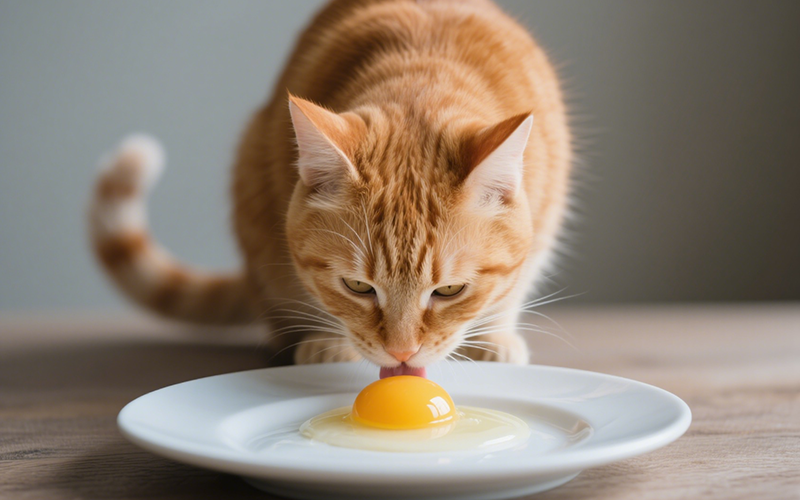
Nutritional Profile of Egg Yolk: What Does It Offer?
Egg yolks are indeed nutrient-dense. Separated from the white, the yolk contains the majority of the egg's fat, calories, and several important vitamins and minerals. Key components include:
Fat: Yolks are high in fat, including saturated and unsaturated fats, as well as cholesterol. Fat is a crucial energy source for cats and necessary for absorbing fat-soluble vitamins.
Protein: While the white contains more protein overall, the yolk still provides high-quality, easily digestible protein.
Fat-Soluble Vitamins: Yolks are a good source of Vitamin A, Vitamin D, Vitamin E, and Vitamin K.
B Vitamins: Rich in several B vitamins, including B12 (cobalamin), riboflavin (B2), folate (B9), and notably, **Biotin (B7)**.
Choline: An essential nutrient vital for brain health, liver function, and nerve signaling.
Minerals: Provide iron, phosphorus, selenium, and zinc.
From this profile, it's easy to see why one *might* consider egg yolk beneficial. However, cats eating a complete and balanced commercial diet already receive these nutrients in appropriate amounts and ratios. The real question isn't *if* yolks contain nutrients, but *if* feeding them *raw* is safe.
The Raw Reality: Major Risks of Feeding Raw Egg Yolk
Despite the nutritional content, feeding raw egg yolk to cats comes with serious potential dangers:
1. Bacterial Contamination (Salmonella, E. coli) - The Primary Threat
This is the **most significant and pressing risk** associated with feeding any raw animal product, including egg yolks.
Presence of Pathogens:** Eggs, even those appearing clean and uncracked, can be contaminated with harmful bacteria like *Salmonella* or *Escherichia coli* (E. coli) on the shell or, less commonly, internally.
Risk to Cats:** While cats may have somewhat more robust digestive systems than humans regarding certain bacteria, they are **absolutely susceptible** to bacterial infections. Illness can range from mild gastrointestinal upset to severe systemic disease. Symptoms of salmonellosis or E. coli infection in cats can include:
Vomiting
Severe diarrhea (sometimes bloody)
Fever
Lethargy
Loss of appetite
Dehydration
In severe cases, sepsis (bloodstream infection), which can be fatal.
Vulnerable Individuals:** Kittens, senior cats, and cats with compromised immune systems (e.g., those with FIV, FeLV, or undergoing chemotherapy) are at much higher risk of developing severe illness from bacterial contamination.
Risk to Humans:** Handling raw eggs or cleaning up after a cat suffering from a bacterial infection poses a significant zoonotic risk – meaning the bacteria can be transmitted to humans in the household, causing illness. This includes contamination of surfaces, food bowls, and litter boxes.
The pervasive risk of bacterial contamination is the primary reason veterinarians almost universally discourage feeding raw eggs (yolk or white) to pets. It simply isn't worth the potential for serious illness in either the pet or the owner. This danger is central to answering "can cats eat raw egg yolk?".
2. Biotin Deficiency Risk (Related to Raw Egg Whites, Not Yolks Alone)
This risk is often mentioned in discussions about raw eggs, but it's crucial to understand the specifics:
Avidin in Raw Egg Whites:** Raw egg *whites* contain a protein called avidin. Avidin binds very strongly to biotin (Vitamin B7), preventing its absorption in the digestive tract.
Biotin Deficiency:** Biotin is essential for healthy skin, coat, and metabolism. Prolonged consumption of raw egg *whites* can lead to biotin deficiency, causing symptoms like hair loss, dry/scaly skin, and lethargy.
Yolk Contains Biotin:** Importantly, the egg *yolk* is actually a rich source of biotin.
The Nuance:** Therefore, feeding **only the raw yolk** does *not* introduce significant amounts of avidin and poses little direct risk of causing biotin deficiency. The yolk's biotin content helps counteract any trace avidin present. However, this point is often moot because the **bacterial risk of the raw yolk remains the overriding concern**. Furthermore, separating yolk from white perfectly can be difficult, potentially introducing some avidin. The primary risk associated with avidin comes from feeding whole raw eggs or raw egg whites regularly.
3. High Fat Content and Related Issues
Egg yolks are concentrated sources of fat and cholesterol.
Pancreatitis Risk:** While less common in cats than dogs, pancreatitis (inflammation of the pancreas) can still occur. High-fat foods, especially if introduced suddenly or fed in large amounts, can potentially trigger this painful condition. Symptoms include lethargy, anorexia, vomiting, and abdominal pain.
Obesity:** Yolks are calorie-dense due to their fat content. Regularly adding them to a cat's diet without adjusting their main food intake can easily lead to weight gain and obesity, increasing the risk of diabetes, arthritis, and other health problems.
Gastrointestinal Upset:** Some cats may simply not tolerate the high fat content well, leading to diarrhea or vomiting even if no bacterial contamination is present.
4. Potential for Allergies
While protein is the most common allergen, and egg whites contain more allergenic proteins, cats can potentially be allergic to proteins found in the yolk as well. Symptoms of food allergies often manifest as skin issues (itching, redness, hair loss) or chronic digestive upset.
Cooked vs. Raw Egg Yolk: A Safer Alternative?
Cooking the egg yolk significantly changes the safety profile:
Bacteria Killed:** Cooking thoroughly (until the yolk is firm) effectively kills harmful bacteria like Salmonella and E. coli, eliminating the primary risk associated with raw yolks.
Avidin Denatured:** Cooking also denatures avidin (in the white, if present), removing the risk of biotin deficiency if any white was included.
Nutrients Remain:** Cooked yolk still provides protein, fat, vitamins, and minerals.
Therefore, a small amount of **plain, fully cooked** (hard-boiled or scrambled without oil, butter, salt, or milk) egg yolk is considered a much safer occasional treat for *most* healthy adult cats than its raw counterpart. However, the concerns about high fat and calories still apply, so moderation remains crucial even with cooked yolk.
Veterinary Consensus and Recommendations
Given the significant risks, particularly bacterial contamination, the vast majority of veterinarians and reputable animal health organizations (like the FDA, CDC, AVMA) strongly advise **against** feeding raw eggs (whole, white, or yolk) or any raw meat/poultry to pets. The potential nutritional benefits offered by a raw yolk are minimal compared to the risk of serious illness for the cat and potential transmission to humans. A complete and balanced commercial cat food provides all necessary nutrients safely.
"What About Pasteurized Eggs?"
Pasteurization involves heating eggs briefly to a specific temperature to kill *most* harmful bacteria, including Salmonella, without fully cooking the egg. While using pasteurized eggs to prepare raw yolk *reduces* the bacterial risk, it doesn't completely eliminate it. Some bacteria might survive, and contamination can still occur during handling and preparation. Therefore, while potentially *safer* than standard raw eggs, pasteurized raw yolk still carries more risk than cooked yolk and is generally not recommended.
What to Do If Your Cat Eats Raw Egg Yolk
If your cat accidentally consumes raw egg yolk: 1. **Don't Panic Immediately:** A single instance, especially with a fresh egg from a reliable source, might not cause issues, but monitoring is crucial. 2. **Prevent Further Access:** Ensure the cat cannot consume more. Dispose of any remaining raw egg safely. 3. **Monitor Closely:** Watch your cat carefully for the next 24-72 hours for any signs of illness, particularly: * Vomiting * Diarrhea (note consistency, frequency, presence of blood) * Lethargy or depression * Loss of appetite * Fever (you might notice warmth, listlessness) * Dehydration (check for skin tenting, dry gums) 4. **Practice Good Hygiene:** Wash your hands thoroughly after handling anything the cat or the raw egg touched (bowls, surfaces, litter box). 5. **Contact Your Veterinarian:** * Call immediately if your cat shows **any** signs of illness. * Inform them even if no symptoms appear, especially if the cat is young, old, or has health issues, or if you have concerns about the egg's freshness or source. They can advise on specific things to watch for.
Raw Egg Yolk Safety for Cats: Risk Summary Table
This table summarizes the key points:
| Risk Factor | Concern Level for Cats | Details & Recommendation |
| Bacterial Contamination (Salmonella, E. coli) | VERY HIGH RISK / DANGEROUS | Risk of severe G.I. illness or sepsis in cats; Zoonotic risk to humans. Primary reason to **AVOID RAW YOLK.** |
| Biotin Deficiency (Avidin) | Low Risk (from Yolk Alone) | Avidin is mainly in raw white; yolk contains biotin. Not a major concern for yolk-only feeding, but bacterial risk overrides this. |
| High Fat Content | Moderate Risk / Unhealthy (in excess) | Potential pancreatitis trigger, contributes to obesity, can cause G.I. upset. Moderation crucial even if cooked. |
| Potential Allergies | Low Risk | Possible, though less common than other protein allergies. |
| Nutritional Benefits | Present (but available elsewhere) | Yolk is nutrient-dense, but balanced cat food provides these safely. Benefits don't outweigh risks of raw feeding. |
| Overall Answer to: Can cats eat raw egg yolk? | NO. Due to the high risk of bacterial contamination (Salmonella, E. coli) posing danger to both cats and humans, feeding raw egg yolk is strongly discouraged by veterinarians. Potential nutritional benefits are negligible compared to risks. Plain, cooked yolk in moderation is a much safer alternative. | |
Leveraging Pet Tech for Health Questions: PettureX App
Navigating the complex world of pet nutrition and potential food hazards can feel daunting. When questions about food safety arise, or if you observe symptoms after your cat eats something unusual, having quick access to information is vital. The **PettureX** app is a smart tool designed to support pet owners. PettureX offers features such as:
24/7 AI Veterinary Consultation: Use the AI chat feature to ask general questions about food safety, symptoms, or nutritional needs (e.g., "What are the symptoms of Salmonella in cats?" or "Why is biotin important for cats?"). Get immediate, AI-generated information to help you understand potential issues. *Please remember, AI consultations provide general knowledge and cannot replace a professional veterinary diagnosis or personalized treatment plan.*
Image Recognition for Pet Health:** Useful for identifying visual health concerns to discuss with your vet.
Animal Species Identification:** Helps identify potentially harmful items or creatures in your pet's environment.
PettureX can be a valuable resource for quick information gathering, empowering you to make informed decisions about your pet's care in partnership with your veterinarian.
Safer, Healthier Treat Alternatives for Your Cat
Instead of risking illness with raw egg yolk, choose treats that are safe, healthy, and species-appropriate: * **Small Pieces of Plain Cooked Meat:** Unseasoned chicken, turkey, lean beef, fish, or lamb (ensure no bones) are excellent choices. * **Plain Cooked Egg Yolk (Occasional & Tiny Amount):** As discussed, thoroughly cooked yolk eliminates the main risks of raw feeding. Still high in fat/calories, so moderation is essential. * **High-Quality Commercial Cat Treats:** Look for meat-based treats low in fillers and calories. Lickable treats, dental treats, or crunchy treats designed for cats are good options. * **Freeze-Dried Meat Treats:** Single-ingredient treats (chicken, salmon, liver, minnows) offer intense flavor and high-quality protein. * **Catnip or Cat Grass:** Provide safe enrichment and satisfy chewing urges. Always introduce new treats slowly and ensure they make up no more than 10% of your cat's total daily caloric intake.
Conclusion: Cook it Safe, or Skip the Yolk
To conclude the discussion on "can cats eat raw egg yolk?", the veterinary consensus is clear: **it is not recommended due to the significant risk of bacterial contamination** (Salmonella, E. coli), which poses a health hazard to both your cat and your household. While the yolk itself is nutritious and doesn't carry the avidin risk associated with raw egg whites, the potential for causing serious illness far outweighs any perceived benefits. If you wish to offer egg yolk as an occasional treat, **always opt for plain, thoroughly cooked yolk** and serve it in very small quantities due to its high fat and calorie content. Prioritize feeding your cat a complete and balanced commercial diet formulated for their specific life stage, and choose safe, species-appropriate options for treats. Consulting your veterinarian before making any significant changes to your cat's diet is always the safest course of action.
Related
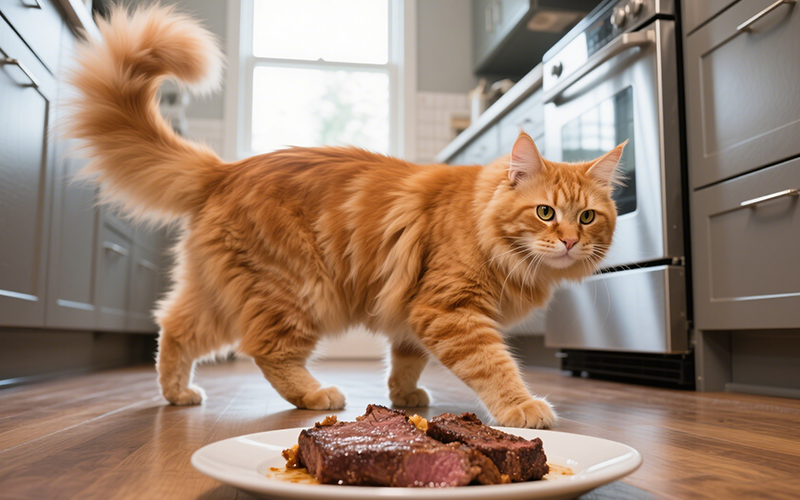
Can Cats Eat Roast Beef? A Vet-Reviewed Guide to Safe Sharing
- 30 Apr 2025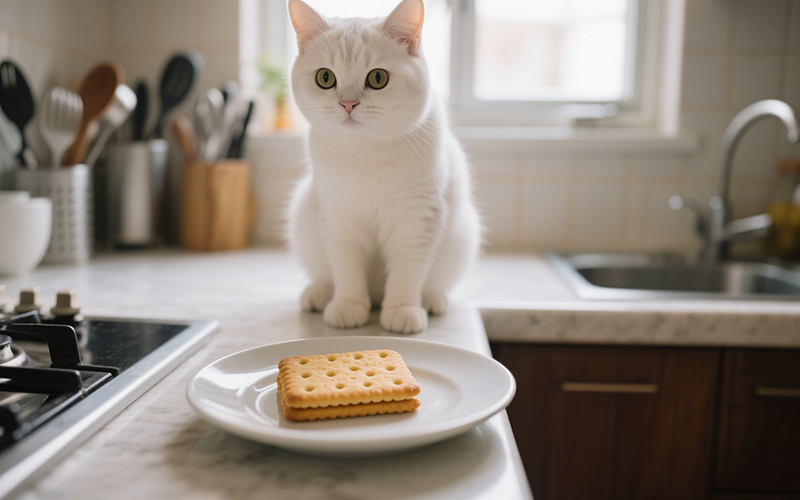
Can Cats Eat Ritz Crackers? Vet-Reviewed Risks & Why You Should Say No
- 30 Apr 2025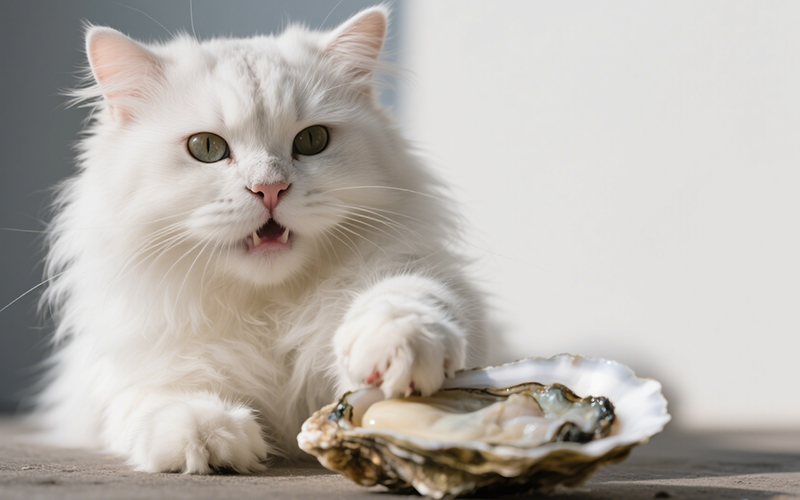
Shucking the Myths: Can Cats Eat Raw Oysters? A Deep Dive into Feline Safety
- 29 Apr 2025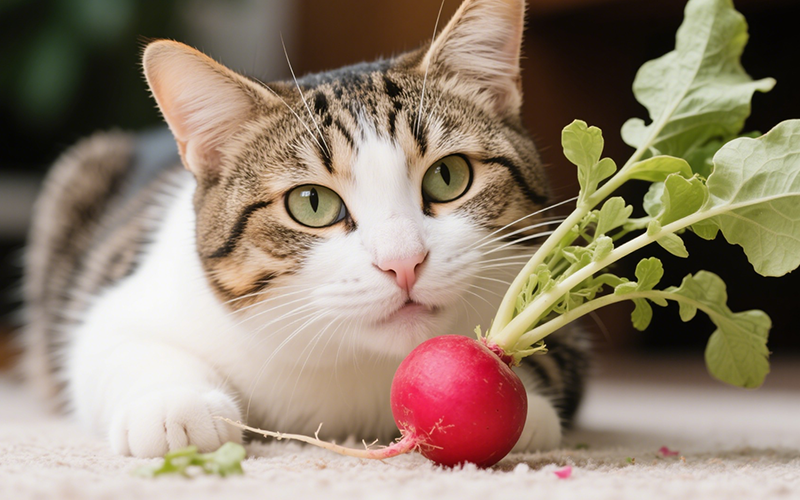
Radish Reality: Can Cats Safely Nibble This Peppery Root? A Vet-Reviewed Guide
- 28 Apr 2025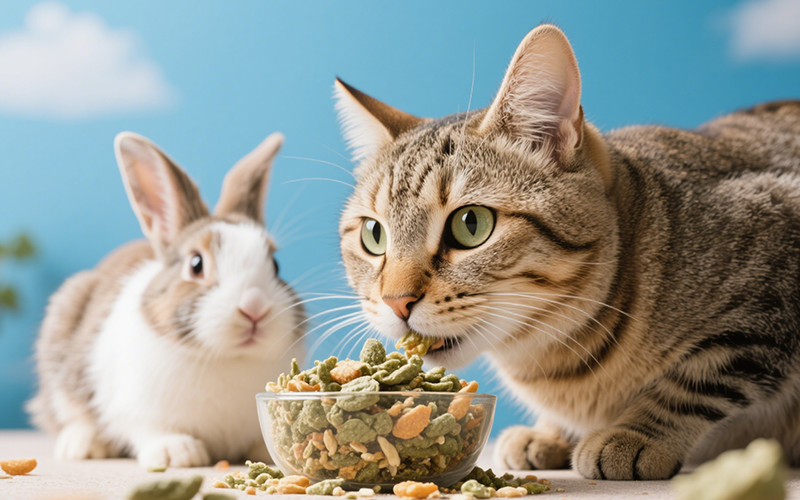
Rabbit Food & Felines: Can Cats Eat Rabbit Food Safely? Why Vets Say No
- 28 Apr 2025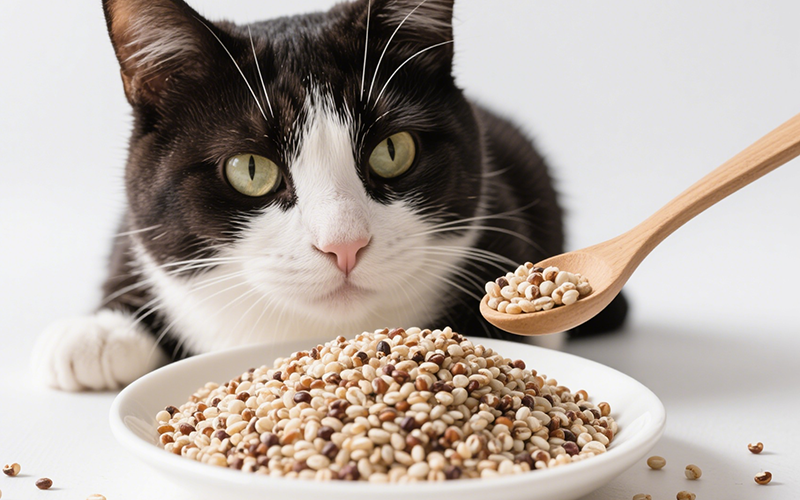
Quinoa for Kitties? Unraveling the Safety of This Trendy Grain for Cats
- 26 Apr 2025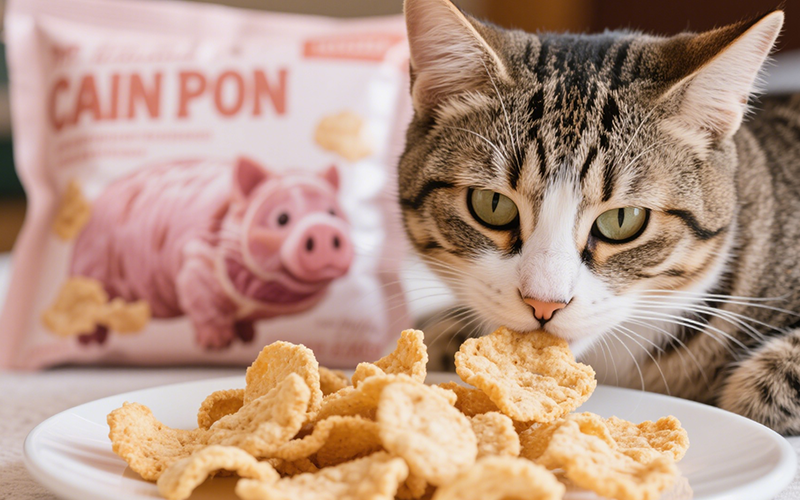
Crunch Time Danger: Can Cats Eat Pork Rinds? A Vet's Perspective on This Salty Snack
- 26 Apr 2025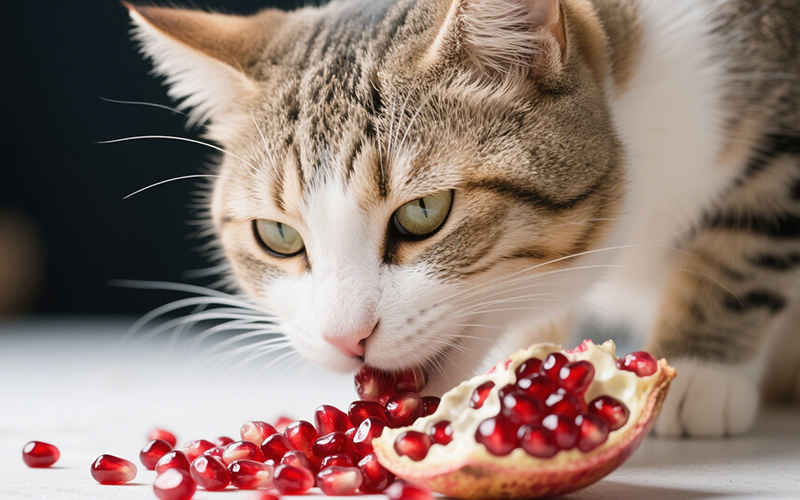
Pomegranate Peril: Can Cats Eat the Seeds Safely? A Vet-Reviewed Guide
- 25 Apr 2025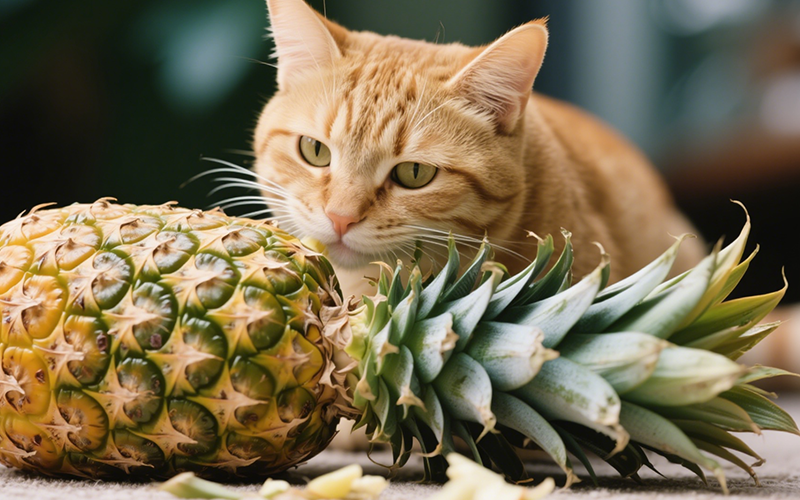
Prickly Problem: Can Cats Eat Pineapple Leaves Safely? A Vet-Reviewed Risk Analysis
- 25 Apr 2025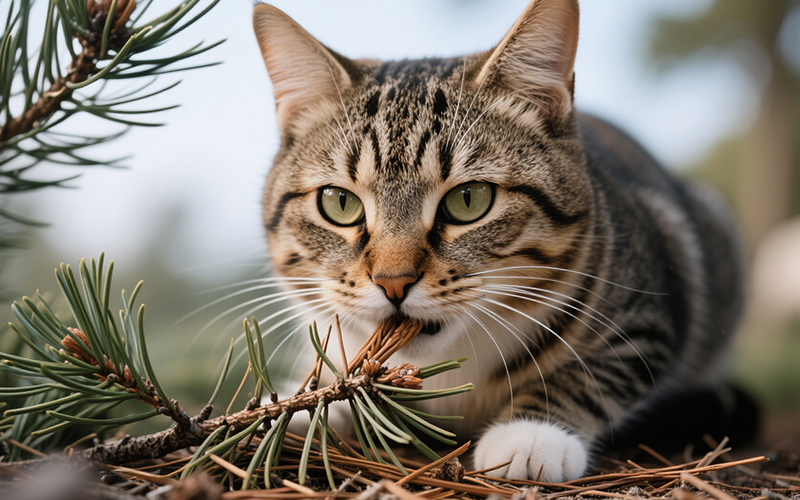
The Prickly Truth: Can Cats Eat Pine Needles Safely? A Guide for Concerned Owners
- 24 Apr 2025
